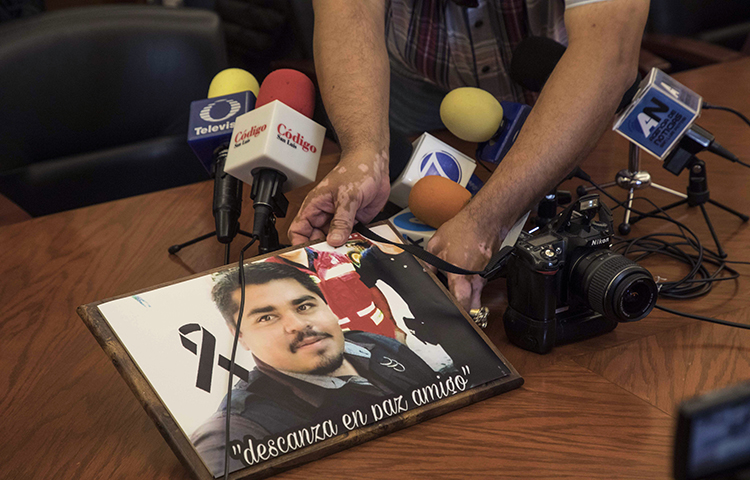Mexico City, October 6, 2017–Authorities in Mexico must undertake a swift and credible investigation into the murder of photographer Edgar Daniel Esqueda Castro, the Committee to Protect Journalists said today.
A spokesperson from the state attorney general’s office today told CPJ that state authorities found Esqueda Castro’s body this morning, near the airport in the city of San Luis Potosí. His body had three gunshot wounds, the office said.
The journalist’s wife, who CPJ has not named for safety reasons, told CPJ that armed men in police uniform who identified themselves as local police yesterday abducted Esqueda Castro from their home in San Luis Potosí.
She said the group of men, armed with pistols and at least one automatic rifle, broke the window of the front door of the couple’s home and stormed into the room where she and her husband were asleep. The attackers then collected the couple’s cellphones, and took Esqueda Castro away at gunpoint, Esqueda Castro’s wife said.
“Mexican authorities must swiftly investigate the abduction and murder of Edgar Daniel Esqueda Castro, and bring all of those responsible to justice,” said Alexandra Ellerbeck, CPJ’s program coordinator for North America, from New York. “Criminals, sometimes connected with state actors, know that they can get away with killing journalists in Mexico because of chronic impunity for these crimes. Until that changes, the violence will continue.”
The state’s general prosecutor said yesterday in a statement made on social media that the prosecutor’s office is investigating, and denied that state police were involved in the abduction. The prosecutor also said there was no arrest warrant against Esqueda Castro.
Ricardo Sánchez Pérez del Pozo, the Federal Special Prosecutor for Crimes Committed against Freedom of Expression, told CPJ yesterday that his agency had opened a separate investigation.
Esqueda Castro worked as a freelance photographer for the local news websites Metropoli San Luis and Vox Populi, and edited a personal website, Infórmate San Luis. According to Esqueda Castro’s editor at Vox Populi, Gerardo Guillermo Almendariz, Esqueda mostly covered society events, but would sometimes work on crime stories.
Over the past few months, local police had threatened Esqueda Castro while he was reporting, according to both the journalist’s wife and Guillermo Almendariz. On July 13, policemen threatened Esqueda Castro verbally, took pictures of his identification card, which included his address, and told him they were watching his home. Separately, several policemen on July 4 beat Esqueda Castro and threatened to take his camera while the journalist was photographing a shootout scene.
Esqueda Castro reported both incidents to the state authorities, and filed a complaint with the State Human Rights Commission, according to Guillermo Almendariz.
In a statement released this afternoon, the Federal Mechanism for the Protection of Human Rights Defenders and Journalists, a government body that provides protective measures to reporters under threat of violence, confirmed the threats, and stated that it had offered protective measures to Esqueda Castro. According to the protective group, Esqueda Castro refused protection, and said that he received no other threats after the two July incidents.
The journalist’s wife and Guillermo Almendariz confirmed to CPJ on Thursday that Esqueda had not been enrolled in a protection scheme.
Mexico is the deadliest country in the Western hemisphere for journalists. In 2017, at least four journalists have been murdered in direct retaliation for their work, according to CPJ research, and CPJ is investigating the circumstances of another two killings. CPJ has documented the disappearances of 14 journalists in Mexico, excluding Esqueda Castro. In May, journalist Salvador Adame Pardo was abducted from his home in the Mexican state of Michoacán.
EDITOR’S NOTE: The final paragraph has been corrected with the number of killings under investigation by CPJ.
